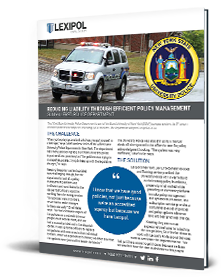The Challenge
In his 15-plus years with the City of Batavia (NY) Fire Department (CBFD), Captain Dan Herberger has seen a lot of change, including a string of chiefs and interim chiefs. The department’s mission changed as well. “We went from being a 56-firefighter department doing EMS and transport with two stations, to a department with no ambulance service and first-response EMS with one station,” Capt. Herberger says.
The rapid pace of change had an effect on the department’s policies. “We lost a lot of continuity over those 15 years, and it created a situation where we really needed to reorganize,” Capt. Herberger says. “We had a lot of old, outdated policies. We did a lot of policy by memo or email. So, we didn’t know where to begin organizing and updating everything.”
While serving as interim chief, Capt. Herberger began the lengthy process of working toward department accreditation through the Center for Public Safety Excellence. “One phrase struck me during those initial accreditation meetings: An unwritten policy or procedure is just a good idea,” he says. That realization was the catalyst for the department to look for an outside solution to get its policies in order.
The Solution
The CBFD selected Lexipol’s New York Fire Policies and Training solution and a supplemental manual to store its procedures. “Policy is what we need to do, procedures is how we do it,” Capt. Herberger says.
As the department started reviewing policies and procedures against the Lexipol content, Capt. Herberger asked a lot of questions. “I would survey the fire officers, ask them what do we do in this situation? What does this mean to you?” he says. That process exposed some inconsistencies in the members’ understanding of department policy and procedure, further underscoring the need to have shared, written directives.
The CBFD adopted Lexipol policies with as few changes as possible. But because one of the main goals was establishing continuity of operations, the fire department didn’t just abandon the previous policy content. “I gathered all the old memos and general orders together and went through it closely,” Capt. Herberger says. “There’s some stuff that’s still applicable today, and when we see that, we reapply it.”
He also makes the old content available to personnel. “It gives them a little history,” he says. “In many cases we found that we were doing things a certain way for a good reason, and we may just need to bring it up to date.” That approach has helped build acceptance for the revised content.
The department issues Lexipol’s Daily Training Bulletins (DTBs) to reinforce the policies and uses the mobile app to engage CBFD firefighters with the new content. “The firefighters were initially a bit leery that they were getting all these new policies, but since then it’s been very well received,” Capt. Herberger says. “I see them using the mobile app. We have iPads on all frontline vehicles, so it’s really nice to be able to look up a policy and access the procedures and related forms.”
Since the CBFD has been a Lexipol customer, Capt. Herberger has seen progression in Lexipol’s Knowledge Management System. Editing policies has become easier as Lexipol’s in-house development department works to make the system function more like standard word-processing software. “I really can’t say enough about the customer service,” he says. “If I have a problem, I can call the help desk, a lot of times they can solve the issue instantly. And our account manager is always there as a single point of contact to funnel questions and requests.”
The Results
Implementing Lexipol has provided the CBFD with the opportunity to reflect on current practice. “Instead of saying that’s the way we’ve always done it, you look at it through a different prism,” Capt. Herberger says. “If we’re doing something different than the subject matter experts, lawyers and fire service professionals who developed the Lexipol content, we should have a good reason for doing so.”
Through that process, consistency of operations has been the number one benefit the CBFD has experienced. “We’re making the unwritten into written,” Capt. Herberger says. “I don’t think anyone should be expected to know every word of every policy, but if you know the gist of it, you have a playbook for those situations we don’t encounter every day.”
Although the department’s leadership situation is now stabilized, Capt. Herberger also sees Lexipol as an important tool to provide continuity through future leadership changes. “When in the future years we have captains ready to take over for the chief, we won’t have to reinvent the wheel,” he says. “This will help make the job easier for the future leaders of the department.”




